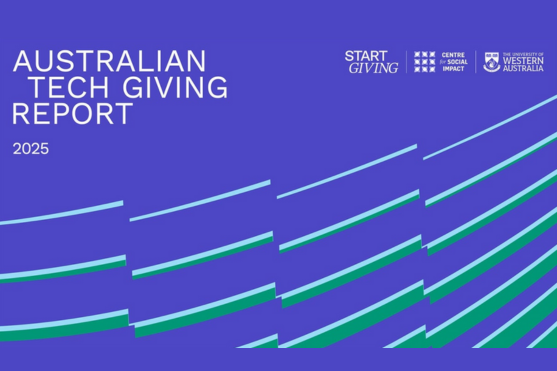Tech founders could redefine philanthropy – and create a new opportunity for charities

Australia’s philanthropic landscape is undergoing a quiet revolution, led by a new generation of tech founders. The recently released Australian Tech Giving Report 2025, a collaboration between StartGiving and the Centre for Social Impact at the University of Western Australia, offers the first comprehensive benchmark of personal philanthropy in the tech sector. For charities and not-for-profits, the findings present a window of opportunity, writes Antonia Ruffell, CEO of StartGiving.
The report reveals that tech founders are not only more likely to give than the general population, but they’re also giving earlier, giving more and giving differently. In just a few years, their contribution to major philanthropy has grown from 1% to 21% of total grants made by Australia’s Top 50 givers.

However, what sets tech philanthropists apart is their mindset. These are self-made individuals, many from humble beginnings, who often attribute their success to a mix of hard work and luck. As Dimitry Tran, co-founder of Harrison.ai, shared in an AFR article covering the report’s launch: “This money is not even ours to begin with, right? We were lucky that we accumulated this opportunity and wealth, and it’s not, you know, for us to use for ourselves because how much can we spend on one person?”
Many tech founders express discomfort with their wealth and have a strong desire to give back. They’re action-oriented, impact-driven and comfortable with risk – traits that are translating into bold, early-stage philanthropic commitments.
We’ve seen this desire to create impact earlier in life play out in real time. Robin Khuda’s $100 million gift to the University of Sydney to support STEM education for girls, Atlassian co-founder Scott Farquhar’s decision to focus on philanthropy through the Skip Foundation, and the Canva co-founders’ pledge to give away the majority of their multi-billion-dollar fortunes are not isolated acts. They’re part of a growing movement.
For charities and not-for-profits, this presents a unique opportunity to engage with a new kind of donor who seeks to understand the impact of their contributions and collaborate on solutions. They’re also often open to funding innovation, making big bets and supporting causes that more conventional donors may overlook.
At StartGiving, our mission is to inspire a culture of giving in Australia’s tech sector. We believe that philanthropy should be the norm, not the exception, for successful tech founders. And we’re seeing encouraging signs. According to the report, 67.8% of surveyed members of the tech community donate money, compared to just 27.5% of Australian taxpayers.
Charities can play a crucial role in this transformation. By understanding the values and motivations of tech donors, and by offering flexible, transparent and impact-focused giving opportunities, not-for-profits can become trusted partners in a tech founder’s philanthropic journey.
Charities also need to be ready to engage with donors earlier in their wealth journey. Many tech founders are looking to establish giving structures and become more proactive about their giving, particularly around liquidity events such as the sale of their company, rather than waiting until retirement. For not-for-profit leaders, this requires striking a tricky balance: investing time in building relationships with founders who may not yet be ready to give, while also responding quickly and thoughtfully when new wealth is realised – often at a moment when the individual is learning about philanthropy for the first time.
The Australian Tech Giving Report 2025 is more than just a snapshot of current trends; it’s a call to action. For the tech community, it provides actionable insights and inspiration for those considering starting or scaling their giving journey. For the for-purpose sector, we hope it will prompt a different kind of engagement with this new generation of wealth creators who are thoughtful, optimistic, generous and deeply committed to making a difference.
To learn more about the report’s findings, register for StartGiving’s webinar on 9 September with its academic research partners, the Centre for Social Impact (CSI). The audience with join Antonia Ruffell, Arminé Nalbandian, CSI’s CEO, and tech founder and giver Anthony Woods. Anthony is a co-founder of Grafana Labs, a global tech company valued at over US$6B, and co-founder, with wife Joanne, of the AOJ Woods Foundation.